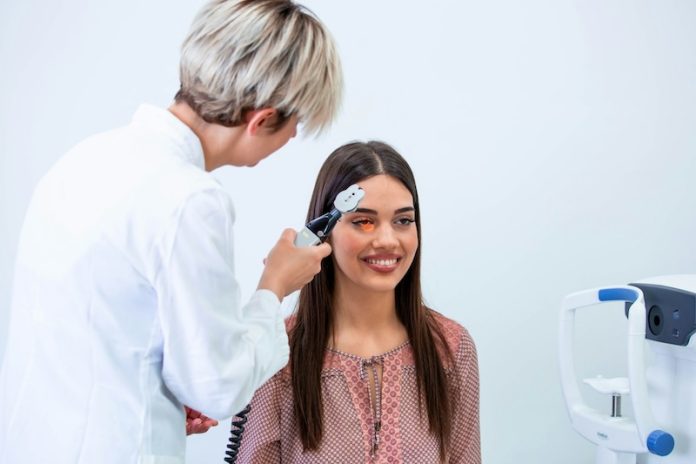
A new study has shown that artificial intelligence (AI) can help doctors detect the risk of heart attacks and strokes simply by scanning a patient’s eye. For the first time, researchers have tested this AI-powered eye scan in general practice (GP) clinics, where people usually go for routine medical care.
The results suggest that this quick and painless test could be a useful new tool for spotting heart disease early—without the need for needles or lab tests.
The research, published in npj Digital Medicine, was led by Ph.D. student Wenyi Hu from the University of Melbourne, working with the Centre for Eye Research Australia (CERA). The study involved 361 adults aged between 45 and 70 who had recently undergone some form of heart health check, like a cholesterol or blood pressure test.
Each participant had a quick eye scan using a desktop retinal camera, which takes a picture of the blood vessels at the back of the eye. The scan was then analyzed instantly by an AI tool, which gave a report on the person’s risk of developing heart disease or having a stroke.
To check how reliable the AI scan was, the researchers compared its results with the World Health Organization’s (WHO) standard heart disease risk tool. This tool calculates risk based on age, sex, blood pressure, cholesterol, smoking, and diabetes status.
The results were also compared to real-world data from over 27,500 people in the UK Biobank to see how well the eye scan could predict future heart events.
The findings were promising. The AI-based eye scan gave similar results to the traditional WHO tool in predicting heart disease and stroke over 10 years. In 67% of cases, the AI and the WHO score matched.
In some cases, the AI overestimated or underestimated the risk, especially in older men, which the researchers say needs further work. Still, the test correctly scanned and graded the eyes of 94% of participants, showing that the technology is practical and easy to use in a GP clinic.
Patients and doctors were also asked what they thought about the scan. Most were satisfied: over 92% of patients and nearly 88% of doctors said they liked the technology and would be happy to use it again.
Dr. Malcolm Clark, a general practitioner whose clinic took part in the study, believes this tool could help identify people at risk who might otherwise be missed. He imagines a future where patients receive a text message inviting them to have a quick eye scan before their GP visit.
The results would be sent to the doctor, who could then arrange follow-up tests if needed—much like current reminders for other screenings, such as cervical or bowel cancer checks.
Associate Professor Lisa Zhuoting Zhu, a senior researcher on the project, sees this as a major step toward more personalized and accessible health care. She believes that AI-powered tools like this can make heart health checks cheaper and more widely available—especially in remote or underserved areas.
Beyond heart health, she adds, AI eye scans might one day help doctors monitor brain and kidney health too. Since the blood vessels in the eye are closely linked to those in other parts of the body, the eye offers a unique and non-invasive way to assess overall health.
This study marks a significant breakthrough in bringing AI-based health tools into everyday clinics. The idea of using a simple eye scan to screen for heart disease is both exciting and practical. It removes many barriers that stop people from getting regular heart checks, such as fear of blood tests, cost, or time.
While the scan is not perfect and needs refinement—especially for older male patients—it has shown good accuracy and high acceptance among patients and doctors. The fact that the test takes only a few minutes and delivers instant results makes it ideal for busy general practices.
Importantly, this research also highlights how AI can support preventive health care. Rather than waiting for symptoms to appear, tools like this can catch health issues early and guide patients to get help before problems get worse.
As the technology improves and becomes more widely available, it has the potential to play a key role in reducing the burden of heart disease—a leading cause of death worldwide.
With further development and testing, AI eye scans could become a routine part of health checks in GP clinics everywhere, offering a fast, simple, and scalable way to protect people’s health.
If you care about heart health, please read studies that apple juice could benefit your heart health, and Yogurt may help lower the death risks in heart disease.
For more information about health, please see recent studies that Vitamin D deficiency can increase heart disease risk, and results showing Zinc and vitamin B6 linked to lower death risk in heart disease.
The research findings can be found in npj Digital Medicine.
Copyright © 2025 Knowridge Science Report. All rights reserved.



